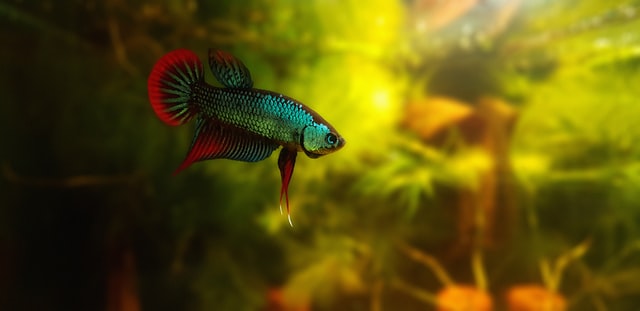Table of Contents
To take care of a betta fish is to know how keep them healthy and happy, and how to avoid causing them any form of stress. In this article we would give a complete care guide for the betta fish, including all that is needed to have them in a living environment healthy for the betta fish. This includes the size of recommended tanks, care, feeding, quality of water and a lot more.
Betta fish (also known as Betta splendens or anti-Siamese fish) are a long-term favorite pet of both emerging and experienced fish keepers because of the bright jewel colours and amazing fins, they have been mistaken for the siamese fighting fish because of their extreme betta’s rage towards other bettas.
Bettas live in ponds that are shallow, canals, and small streams. Most times the water is warm and sluggish, and sometimes low when it is in dissolved oxygen, hence nature equipped them with a breathing feature through a labyrinth organ, enabling them to survive in shallow water.
Caring for the betta fish – Housing
The major thing that should be taken into consideration is the environment. This is because this species of fish are not very active and so have no need for space. Notwithstanding, they need large tanks to stay, but not deep tanks as they are not bottom dwellers.
The container should be made standard, and square shaped, then it should have sides that are rounded, and little openings that could be linked to the top, with options for filter only, the system of filtration should be very effective because the betta fish is sensitive to infection from bacteria.
Betta Fish Tank Size
They should be kept in a well-balanced fish tank. Since they can breathe on the surface of water, they are more comfortable in a little current of water. The male counterparts live best in a one liter size and prefer tanks that have no aggressive mates. Stable water levels are very important for betta fish.
Decorating a betta fish tank
This is exciting and fun to be done because there are various sizes, shapes, and colours with which the aquarium can be decorated. More so, it is necessary to think about the betta fish while picking ornaments for the tank.
The decoration of the tank should not take too much tank, most ornaments usually possess edges that are sharp enough to easily tear off fins that are fragile, and ornaments like this should not be in the betta tank decorations. Gravel and plants can be used in the tanks to make the species comfortable. Bettas are good jumpers so the tank should be kept secure.
How to take care of the betta fish Temperature
It is best to keep the temperature for betta fish between 76 ° and 85 ° F and a PH of about six point eight and seven point five, they sometimes enjoy temperatures that are cooler, but this can make them susceptible to diseases, so it is best to keep the temperature between.
Do Bettas Need a Heater?
This species are very sensitive to heat, which makes a fish tank heater necessary. The room temperature is usually between 67 ° F to 69 ° F, betta fish without a heater may become ill due to stress.
Buy a safe aquarium thermometer for the purpose of recording the temperature of the water. The heaters can be adjusted and they usually have in-built thermostat. Change of the temperature should be done systematically but slowly because sudden changes will result in stress and affect the health of the fish.
Water requirements for the betta fish
The type of water used in the tank is also important. The water in the tank has to be free of contaminants like the chlorine. Avoid tap water because sometimes they have chemicals that are harmful like the chlorine and even metals that have a lot weight, and these chemicals can affect the health of the fish and lead to stress. Remove these chemicals with a water conditioner to prevent any form of injury.
The PH level of the water for the betta fish should be a little acidic. Betta fish perform very well at a PH level of six point five to seven point five, (seven is usually neutral).
The Filter Requirement of a Betta Fish
While filters are not mandatory, they are highly recommended for aquariums larger than 3 liters. Filters are not compulsory but they are necessary in fish tanks that are bigger than three liters.
They help to minimize harmful and infectious bacteria, they also help in cleaning up toxins and for the maintenance of the aquarium; a low flow filter does this well.
Also the spongy filters are a nice choice for betta fish because they are very gentle, reliable, and easy to use.
Cleaning of the aquarium decorations
The decoration require adequate care since they are a part of the aquarium. Their maintenance is necessary to the health of your betta fish. Use only approved ornaments that will not harm your betta fish. You can use an algae removal or a magnetic brush to remove algae every time the tank becomes cloudy.
The filter and its media can be cleaned by simply rinsing them in clean water. Do not use soap for it is not easily rinsed off and can be harmful to the betta fish. New and existing decorations should be washed with hot water, including the stones to remove contaminants and dust.
How Frequent Can I Clean a Fish Tank?
For a 10 liter tank with your betta fish, you may only need to clean the aquarium once or twice a month by 30% of the water. However, if you have a small 1-gallon container, you should clean the tank every two to three days with 100% water changes.
A filtered 5 liter tank will require only 1-2 cycles of water per week for about twenty-five percent total volume and about one hundred percent changes monthly, this should be done based on the quality of the water, like a non-filtered tank requires 1-2 water cycling of about 25% and a 100% water change each week.
Remember to add live plants as this can help lower levels of ammonia that are naturally in water. When you want to cycle only water, do not bring out the betta as it could result in an injury and an unnecessary stress. Remove the betta only when the water is undergoing total changes.
They are always too familiar with their own environments and are negatively affected by changes that happen quickly, so it is okay to change the water frequently. Confirm the temperature because changes that come from the fresh water can result in panic.
Change the water fractionally to ease them of the panic and maintain the same level of PH and temperature. Also use dischlorination anytime you add fresh water from the tap.
Compatibility and the behavior of the Betta Fish
The male species of the betta fish are usually territorial to each other like we already established, and that’s why they are very popularly called “Siamese fighting fish”. They are very aggressive to each other. The males also show aggressive behavior towards the females as well.
The female species of betta fishes like to live in a group of five and even more, the tank size also has to be a larger one at least 10 gallons or bigger in size.
They should also be kept separately, although they can be kept with other species in a fifteen liter aquarium or more, as long as you provide them with a large aquarium (at least 10 to 20 liters in size) with abundant cover and live plants. There is also a list of different tank mates that can be tank mates with the betta. Like the tetra, the barbs, the corydoras catfish, the ghost shrimps, and the snails, as well as other fishes that are not aggressive.
Also find out if your betta fish sleeps
What does Betta Fish eat?
Betta fish need certain foods because they feed on meat, like shrimps, and they feed on insects and the insects’ larvae, on the top of the water while in the wild. Imitating its habit of feeding will make them healthy and happy. The Betta species feed on a variety of flavors like the flakes, the pellets, the dried the live options, so you will need to feed them balanced diet that is high in protein.
They should not eat the same food every day. At least once a week, give them something different from their normal diet.
How Often Should I Feed My Betta Fish?
Betta fish can’t feel when they are satisfied, they are constantly on the lookout for what to eat next, so you have to feed them the right amount and it does not have to be more than two times in a day.
These two rules should be considered while feeding the betta fish:
- Feed them for 2 minutes. You will want to feed them every day, but if you skip a day here and there, that’s fine. If you go on vacation all week, you will definitely need someone to come in and feed your fish every other day anyway, but if you won’t be home all night, they will be fine without food until you return. Stick to the same amount even if you miss a day.
- The portion of the food given to them should be the same as the size of a betta’s eye.
Therefore, give her a small amount of food equal to the size of her eyes. If she does not eat everything within five minutes, remove excess food and feed her a little later.
Overfeeding
It is difficult to estimate how much food a betta fish should eat. Overfeeding them can lead to constipation, bloating and waste from uneaten food in the tank.
Many betta owners are concerned when the fish does not eat, however the actual cause of the not eating is actually over-feeding. They can also reject food in times of stress, especially when you bring them home first.
How to Tell If Your Betta Fish is Happy or Sick
You should be able to identify when your betta fish is healthy or sick. This also determines the kind of care that the fish needs. Endeavour to buy the ones that are healthy on the first purchase.
How to know a healthy betta
They are usually:
- Alert and active
- High Appetite
- Radiant Colours
- Aggressive response to external stimuli
Signs of a sick betta fish
If your bettas show any of these signs of illness or depression, talk to a veterinarian who specializes in fish health:
- Fading colour
- Lack of appetite
- Eyes that are cloudy
- Scales that are high
Spots and fungus round the mouth and the body:
- Poor swimming
- Weight loss
- Bloating
- Low appetite
What is the life expectancy of a betta fish?
Under good care, the species of betta fish can live for about two or three years and even more.
Conclusion
Betta fishes are adorable and lovely and for a lot of reasons, people want them for pets. They however need proper care like other fishes, and should not been seen as fishes that require low level care options. They are intelligent fishes and need to be properly cared for.







